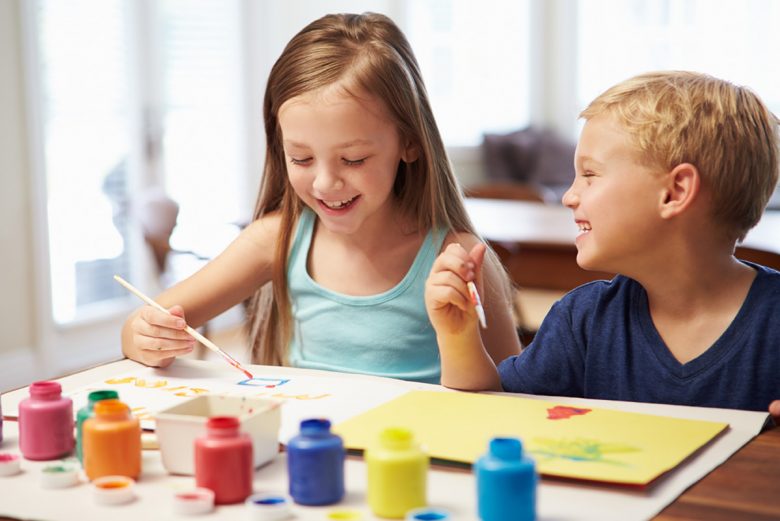
With a little support, every child can get along with their playmates.
Playtime with friends. Every child needs it, but not every child does it the same. Without the right support or guidance, some children can be seen as “bossy” and others “shy.”
In this episode, Carol and Anne share helpful ways to support all 4 Types of children so play dates can be successful and pleasant for everyone.
This episode’s Parenting Practice
This week, pay attention to play time. What can you do this week to set up more successful playdates? As you hear the tips for your child’s Energy Types in this episode, note what comes to mind. Choose one small thing you can alter this week to set your child up for successful play experiences.
Transcript of podcast episode
Anne: We have a friend that has a Type 1 daughter and she would wake her up so early because she was too excited to sleep, “It’s time for my friend to come over!” It’s like, “No. It’s not happening for a while.”
Carol: Welcome to “The Child Whisperer Podcast.” I’m your host, Carol Tuttle, author of the best-selling parenting book, “The Child Whisperer.” I’m with my co-host, Anne Tuttle Brown. “How do you honor a Type 3 child’s style of play where they tell people how to play when other kids don’t like how bossy they are? Is this a problem?”
Anne: For Type 3s, bossy? Tell people how to play? No.
Carol: Is that a problem having Type 3s be in charge of everything? Just kidding. So today we’re gonna talk about how to support your different types of children and their different styles of play. And how to support them to have successful play experiences.
Anne: The Type 1 child is the Fun-loving Child. They are very socially-connected, they have an upward light, bright, animated nature. They will do great with lots of play and breaks from play. They connect, disconnect, and we’ve found that as a parent of a Type 1 child the key is to initiate a lot of them with a variety of friends. You could even have two friends over, so the Type 1 child can bounce back and forth between the friends creating a variety.
Carol: I think too you can start once you understand the four energy types, you can be discerning as a parent, notice some patterns and tendencies for each type child. For a Type 1, what are you noticing as far as what other Type child do they play best with and where do they have some challenges? And things don’t go as well as you would hope? Just to make note of that and support them in having more positive experiences as they grow and develop with the Type of children that…
Anne: And I have noticed that with daughter and Type 3 and we’ll get to that. I think another consideration to create successful playdates with a Type 1 is to notice how far in advance you tell the child about the playdate. When they’re younger, maybe wait until the day of just because they’ll get so excited. We have a friend that has a Type 1 daughter and she would wake her up so early because she was too excited to sleep, “It’s time for my friend to come over!” It’s like, “No, it’s not happening for a while.”
Carol: So when she was younger, she wouldn’t inform her until the day of. Now that she’s older…
Anne: She likes to have something to look forward to, which is a big deal for Type 1s. You gotta have that light experience to look forward to, that fun, and so a playdate creates that. She’s able to look forward to it in advance and think of the fun things that she could do with her friend.
Carol: Yeah, that’s a great idea. Your Type 2 child is your Sensitive Child and they have this ability to plan the details and to look forward to something on the process of planning for it, and that’s part of the experience. The planning becomes a part of the whole experience which…
Anne: So I would say even at an early age, you could tell them about a playdate that you have coming up or plans that you’ve got ahead with friends or an outing. And, so my daughter who’s a Type 3, she has a couple Type 2 friends and when they come over to her house they’re a little bit tentative, or even they’ve preferred to have the playdate at their home. And so expect that, if you have a Type 2 child, that they may prefer to have their friends come to their house so they’re familiar. Even if it’s a good friend, they’ll take a little bit of warming up. Also, as the parent, plan to be with them and play with them for the first 15 to 20 minutes to, kind of, get things going. I’ve noticed when my daughter, she’s a Type 3, but if she has a Type 2 friend come over, I’ll be mindful of that, to sit down and play with them, help create that connection…
Carol: Transition.
Anne: And so that Type 2 feels at ease and comfortable in our space. And then also with the Type 2, make sure to just check in every once in a while. If it’s a longer playdate, offer a little snack break or just a little time of reprieve that then they can…because if they…it’s just like go, go, go, go, go, for three hours, it may be a little bit too much.
Carol: If you’re taking your Type 2 child to a friend’s house and they’ve not been there before, explain to the parent that you’re gonna hang out for 15 minutes or so, that you just wanna support your child in becoming familiar because they’ll just have a more pleasant experience by that.
Anne: And talk to your Type 2 child about that. My daughter had a…
Carol: Yeah, reassure them.
Anne: …had a birthday party and the mother of a Type 2, her friend, came over and she said, “She wants me to stay here for a few minutes.” And I totally got it because I knew she was a Type 2. And when she could see that…it was about 10 minutes, her daughter was smiling and running around with the other girls, she said, “Okay. I’m gonna leave now.” And walked away.
Carol: The daughter was okay with that.
Anne: Mm-hmm. And let your child know that that’s what you’ll do so that they’re not like, “I don’t wanna go yet.” “It’s okay. I’ll be with you.”
Carol: Taking this extra time and effort helps you avoid a lot of unnecessary stress for parent and child. Now, a Type 3 child, which the question actually prompted us to put this together, was Type 3 children like to take charge. And the Type 3 child that’s taking charge too much, overwhelming other children, other kids…there can be some negatives to that. You know, nobody’s kids wants to play with your Type 3 child because it’s just too overwhelming for them. So how do you support a Type 3 child so that they are living true to their nature, but they’re not dominating, domineering?
Anne: Like I mentioned, I’ve noticed what Types of children my Type 3 daughter plays best with. She can take the charge with a Type 2 child a little more readily as they appreciate that gift in the Type 3s and say, “Okay. I’ll follow your lead.” She likes to play with other Type 3s as well, but they can butt heads more quickly. And so I’ve noticed that if we’re having a Type 3 playmate over it maybe a shorter playdate because they’ll hit their limit, or they may need a little bit of like a separation and tend to do their own thing even though they’re both at our house, playing. And she plays well with older or younger kids and so she has that respect for kids that are older. She’s just a more mature 6-year-old and so she can meet them at their level.
Carol: And she can play up to with an 8-year-old.
Anne: Yeah. And if it’s younger, then she can take the charge more readily. I think the younger child will look to her as an authority in the first place.
Carol: Great tips. Now, our Type 4 child is more structured, more analytical and more of an authority in their world to have a say. And I think that, in of itself, needs to be considered even at a young age even at age 4. When a child becomes verbally interactive, that Type 4 child is old enough to have a conversation about what they have some preferences for, to invite them to share their say in things.
Anne: They don’t need as many playmates. They are great solo players, Type 4s. They can play for long periods of time by themselves, but they still will want that connection. So who do they like to play with? Maybe if it’s someone they’ve never met before…
Carol: Ask ’em.
Anne: …they’ll go and hide. My coworker, Katie, said she had a new friend come over to play and she hid and nobody knew where she was and she got out of the playdate, which was…
Carol: Yeah, because she didn’t have a say in who she was playing with. To be successful, you want to ask your Type 4 child, “Who do you enjoy playing with? Who would you like to have a playdate with?”
Anne: And where do you want it? Do you want it here or there? And I would say have a clear start and end-time, and if it’s a new friend, make it shorter. Then the next time make it longer, but Type 4 is very black and white, they’re on their track, they can know, “Okay. Playtime is starting here and it’s ending here.” And not being like, “Is this going on forever? When can I expect this to end and get a break?” And you can really maximize that time.
Carol: And probably more one-on-one playdates than several friends coming over.
Anne: Going back to the main question about the Type 3 child style of play and telling other kids how they want to play or being bossy or taking charge, as we like to say, how do you intervene as a parent to help create a more peaceful play experience?
Carol: I wouldn’t correct them in front of their friends. I’d invite them to have a private conversation and find out maybe the playdate needs to end, maybe there’s something going on you weren’t aware of, what support can you give your child in remedying the situation? Again, helping them learn some social skills as well, “This is a guest in our home and it’s an opportunity to support the child that we’ve invited over or children that we’ve had over. How can we do that more successfully?” But do it privately. No one likes to have correction in front of others. It can be embarrassing, especially the more mature they are, to have that parental feedback that can often feel shaming.
Anne: I think that’s a great suggestion. Oftentimes, what becomes the point of contention when my daughter is playing with a friend is she doesn’t want to share something or she doesn’t want to do what her friend wants to do. And she’ll even say, “I wanna be in charge.” And she wants to be in charge and so I’ll kind of come in and talk to her and pose possible solutions, have her share some. If it’s something, a play toy that’s really special to her, I’m gonna say, “Well, why don’t we put it away and no one plays with it today and we get something else out,” or, “Why don’t we take turns.” You know, you start offering solutions of…
Carol: Or you just choose you’re gonna do that because you know it’s the best decision rather than asking them if that’s the preference. You just make the parental call and say, “Okay. Here’s what we’re gonna do.” Also, learn from it. Step back and go, “Okay. Was that successful? Why did that go all right?” Based on the feedback we’ve shared with you in today’s podcast, learn from the experience, the small corrections that can be made so that you have more successes. Kids get tired, hungry, there’s all kinds of things going on. We get tired of each other as adults and it’s just part of our human nature that relationships can get stressed for various reasons and that’s true for play experiences, so you just… For the most part, you can create a highly successful play experience supporting your child. And you get the benefit of teaching them some social skills, which we just did a podcast on that you can refer to because it’s supportive in behavioral development and helping your child create healthy relationships as they mature.
Anne: That brings us to this week’s Parenting Practice. What can you do this week to set up successful playdates? What alterations do you need to make true to your child’s type to create a successful experience?
Carol: These are simple, little tweaks you’re making as you continue to understand your child’s Energy Type. And, again, remember, each week, the practice is to make small changes and as you make them over extended periods of time, you get big outcomes from them. So just what one small thing can you alter this week that’s going to set your child up to have a successful play experience and develop great social skills true to their nature. Thanks for listening. For more support, go to thechildwhisperer.com where you can purchase the book, subscribe to our weekly Parenting Practice email, and find a transcription and audio of the “Child Whisperer Podcast.”
Anne: If you’re listening on iTunes, thank you for leaving your review. If you have a parenting question, please send it to [email protected].



